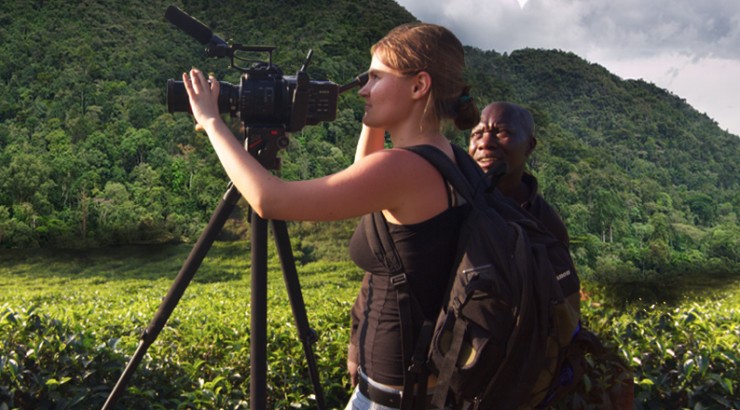
New M.F.A. in Documentary Filmmaking Answers Growing Student Demand
November 3, 2015
Chapman University’s Dodge College of Film and Media Arts, recognized as one of the premiere film schools in the United States, is responding to growing student interest in documentary filmmaking with a distinctive Master of Fine Arts in Documentary Filmmaking focusing on feature-length documentaries.
The M.F.A. program offers a unique curriculum building on interdisciplinary research and content development, knowledge of evolving aesthetic traditions, and critical reflection on the ethical questions inherent to documentary production. Students will also study marketing and distribution; graduates will be industry-ready to develop, pitch, produce and market their work.
Dodge College accepted its first intake of students for the new Documentary graduate program this fall, meeting the needs of a growing market in a time when documentary films are attracting greater audience attention than ever before. Seven of the top ten U.S.-grossing documentaries of all time have been released in the last 10 years, with Michael Moore’s “Fahrenheit 9/11” leading the way with $119M. The demand for documentaries is expected to increase as Netflix and other major platforms now release and stream documentary films exclusively online to great fanfare.
With these new audiences come new opportunities, and the first students in Dodge College’s new M.F.A. in Documentary Filmmaking are ready to capitalize on this interest and lay the groundwork for their careers.
Leading the program at Dodge College are veteran documentarian and sound designer, Associate Dean Michael Kowalski; award-winning documentarian and Professor Jeff Swimmer; and Professor and documentarian Sally Rubin.
Professor Rubin says that what distinguishes this new M.F.A. from other documentary programs is its unique focus on long-form storytelling. “No other program offers an emphasis on the feature documentary form,” she says. “Although students typically make short academic exercise films, feature-length documentaries are what feed the marketplace. Our students will be prepared to examine and create longer, more substantial exploratory docs.”
Another unique advantage for M.F.A. Documentary students is the access they will enjoy to Dodge College’s world-class equipment and facilities, unlike those at universities whose documentary programs are placed in the Journalism or Communications Departments. At Dodge College, students can use a mixing stage, a Foley studio and all of the resources that Film Production students have, from cameras to sound and lighting.
Students will also have the opportunity to travel the world through existing Dodge College travel programs in search of compelling documentary subjects – from Asia to Africa – tackling social, economic and health issues, among many others.
Highlights of the two-year M.F.A. include courses designed to help students build:
- Production experience through a series of short films leading to the completion of a 25-minute film that will serve as the foundation for a feature-length, theatrical documentary
- Both research and storytelling skills, based on interdisciplinary methodologies
- A strong critical foundation based on an understanding of the historical development of the documentary as well as emerging aesthetic forms and a critical appreciation for the ethical questions raised in representing others on film
- The elements of a comprehensive marketing plan that targets distributors as well as theatrical, cable and festival release
Documentary filmmaking has been part of the overall program at Dodge College, growing substantially since 2008, when it was first introduced to the undergraduate curriculum.
Applications are open for classes commencing in Fall 2016. For more information, and to apply, visit www.chapman.edu/mfadoc
About The Dodge M.F.A. In Documentary Filmmaking Faculty
Michael Kowalski
Michael Kowalski is a documentary filmmaker and sound designer, overseeing the M.F.A. Documentary program. He is Associate Dean and Chief Academic Officer of Dodge College of Film and Media Arts at Chapman University.
Kowalski says that a documentarian starts with many views of reality, but needs to find an angle or focus. His fascination is in the creative process of structuring the story. His background – growing up in Europe, earning a Master’s in Visual Anthropology at USC, teaching documentary techniques to students in architecture as a way of understanding how the city affects people – provided multiple ways to see the world. His work covers a wide range of subjects, from the Alamo and medieval knights to a comedic view of a Britney Spears impersonator and an examination of an African-American community as a microcosm of underdeveloped neighborhoods in urban American today.
Kowalski’s extensive credits in filmmaking and sound design and audio post-production go back more than 20 years. He created the sound design on “Rockaway After the Storm” (2014) exploring the social and environmental impact that Hurricane Sandy had on the Rockaway Peninsula in New York, and broadcast on New York Public Television. His recent sound design credits also include “The Double Life of Li Xianglan,” (2014), funded by the Rockefeller Foundation’s Asian Cultural Council and Taiwan’s Culture and Arts Foundation, exploring the early life and multiple personalities of Li Xianglan, a Chinese-born Japanese actress and singer who made a career in China, Japan, Hong Kong, and the United States; “La Piedra Ausente” (2013) about the removal of a pre-Colombian monolith from a small town in Mexico and the subsequent identity crisis the removal caused; “The Black Kung Fu Experience” (2012) for PBS about the history and experience of African-American martial arts fighters; “Scene of a Crime” (2012) exploring a 10-hour interrogation that culminates in a disputed confession, and an intense, high-profile child murder trial in New York state; “Super Solar Yacht,” (2011) for National Geographic, about the design and construction of the world’s largest solar yacht; and “Ray Charles’ America” (2010) for The Bio Channel, about the singer and his music.
Sally Rubin
Sally Rubin is a documentary filmmaker and editor who has worked in the field for more than 15 years, since earning her M.A. in Documentary Film and Video from Stanford University. She recently completed “Life on the Line” about a teenage girl growing up on the U.S./Mexico border. The film broadcast nationally on PBS in Fall 2014 and premiered at the Santa Barbara International Film Festival. Her previous film “Deep Down” was an ITVS-funded feature-length documentary about two friends in eastern Kentucky who find themselves divided over mountaintop removal coal mining near their homes. The film was part of the 2010-2011 Independent Lens Emmy-winning PBS series, and has reached almost 1.5 million people through its broadcast, distribution, and outreach campaign. It was nominated for an Emmy for its Virtual Mine outreach project, in the category of New Approaches to News and Documentary. Rubin is currently working on a feature-length documentary film called “The Hollywood Hillbilly,” about representations of Appalachia and white rural America in the media.
Rubin’s other credits include “The Last Mountain,” about her father’s death in a hiking accident, broadcast on PBS, Robert Greenwald’s “Iraq For Sale: The War Profiteers” (editor) and the television series “The Freedom Files” (editor), as well as David Sutherland’s 6-hour Frontline special “Country Boys” (associate producer), and “Riverwebs” (editor), which broadcast nationally on PBS. In 2004 Rubin founded the groundbreaking Straight Outta Grrrlville Film Festival in San Francisco, and continues to produce local events and benefits for artists and filmmakers, in conjunction with her own work.
Jeff Swimmer
Jeff Swimmer is an award-winning writer and producer of documentary films on both sides of the Atlantic. His programs have aired on BBC, PBS, NBC NEWS, HBO, A&E, CNN, Discovery, The History Channel, Travel Channel, ARTE and more. He has also taught documentary filmmaking at numerous programs in the United States and Europe. His 2001 “Northern Ireland: Dying For Peace” (Supervising Producer, CNN) won a DuPont Award in 2001.
Swimmer’s third book, “Documentary Case Studies,” a behind-the-scenes look at the making of the last decade’s Oscar documentaries, was published by Bloomsbury in 2015. “A Golden State of Mind: The Storytelling Genius of Huell Howswer” aired on PBS affiliates nationwide in 2014 and 2015.
Prior to coming to Chapman, Swimmer taught documentary filmmaking in lectures at UCLA, Cal State-Fullerton, and week-long Intensives at Dok Werkstaat (Bern, Switzerland), The International Film and Television Workshops (Rockport, Maine), Archer School (Los Angeles, CA) and New Roads School (Los Angeles, CA). He has also conducted documentary filmmaking workshops for Oregon Public Broadcasting.
Recently, he wrote and produced “Inside Extraordinary Humans,” a 4-hour series for National Geographic Channel about body engineering. He also wrote and produced “The Sinking of the Andrea Doria” for PBS’s “Secrets of the Dead” series (2006), and “Can Animals Predict Disaster?” for the PBS series “Nature.” (2005). He produced a History Channel hour about the risks of a U.S. West Coast tsunami for the series, “Mega Disasters.” Previously, he produced a one-hour program for National Geographic’s “EXPLORER” about attempts to prevent natural disasters, including the recent tsunami in south Asia. In 2004 he produced a film about Tornadoes (“The Tornado Hunters”) for National Geographic, and field produced parts of the series “Marine Machines,” about cutting-edge marine technology. His directing and producing credits include science and adventure films, historical and investigative programs, profiles and off-beat topics.
In 2003 he worked as Managing Editor of “California Connected,” a weekly current affairs newsmagazine for state PBS affiliates, hosted by David Brancaccio. He also worked as Supervising Producer for CNN Productions, based out of London and overseeing and producing numerous programs, including the 2001 DuPont Award-winning “Northern Ireland: Dying For Peace” (supervising producer). He was a foreign correspondent for Reuters, and a business section columnist for the Philadelphia Inquirer. In 2003/2004 he reported stories for “Marketplace” which aired on NPR affiliates nationwide. A program he taught for at-risk youth at Los Angeles’ Covenant House, sponsored by HBO, was profiled on HBO’S “Buzz Cuts.”
Timothy Wheeler
Timothy Wheeler is a Los Angeles-based director, producer, and Emmy-nominated cinematographer. Wheeler’s latest film “Poached” premiered in competition at SXSW 2015, won top prize at the International Wildlife Film Festival, and is coming to theaters this Fall. HIs directorial feature documentary debut “The Other Shore: The Diana Nyad Story” had its world premiere at SXSW 2013, international premiere at Hot Docs, and was subsequently featured on “Ellen,” “Oprah’s Super Soul Sunday,” “Good Morning America,” and in The New Yorker. “The Other Shore” has been airing on heavy rotation for over a year on Showtime.
Wheeler received a primetime Emmy nomination for Outstanding Cinematography for his work on the Discovery series “Whale Wars”. Other credits include programming for PBS, AL Jazeera, Discovery, The New York Times, and VICE. Wheeler’s visual artistry and storytelling career was first inspired by his contribution to various human rights organizations and nonprofits, including Human Rights Watch and The Coalition Against the Use of Child Soldiers in Colombia. He has a Master’s in Journalism focused in documentary film from UC Berkeley, and has enjoyed travel and work in more than 60 countries.
###

